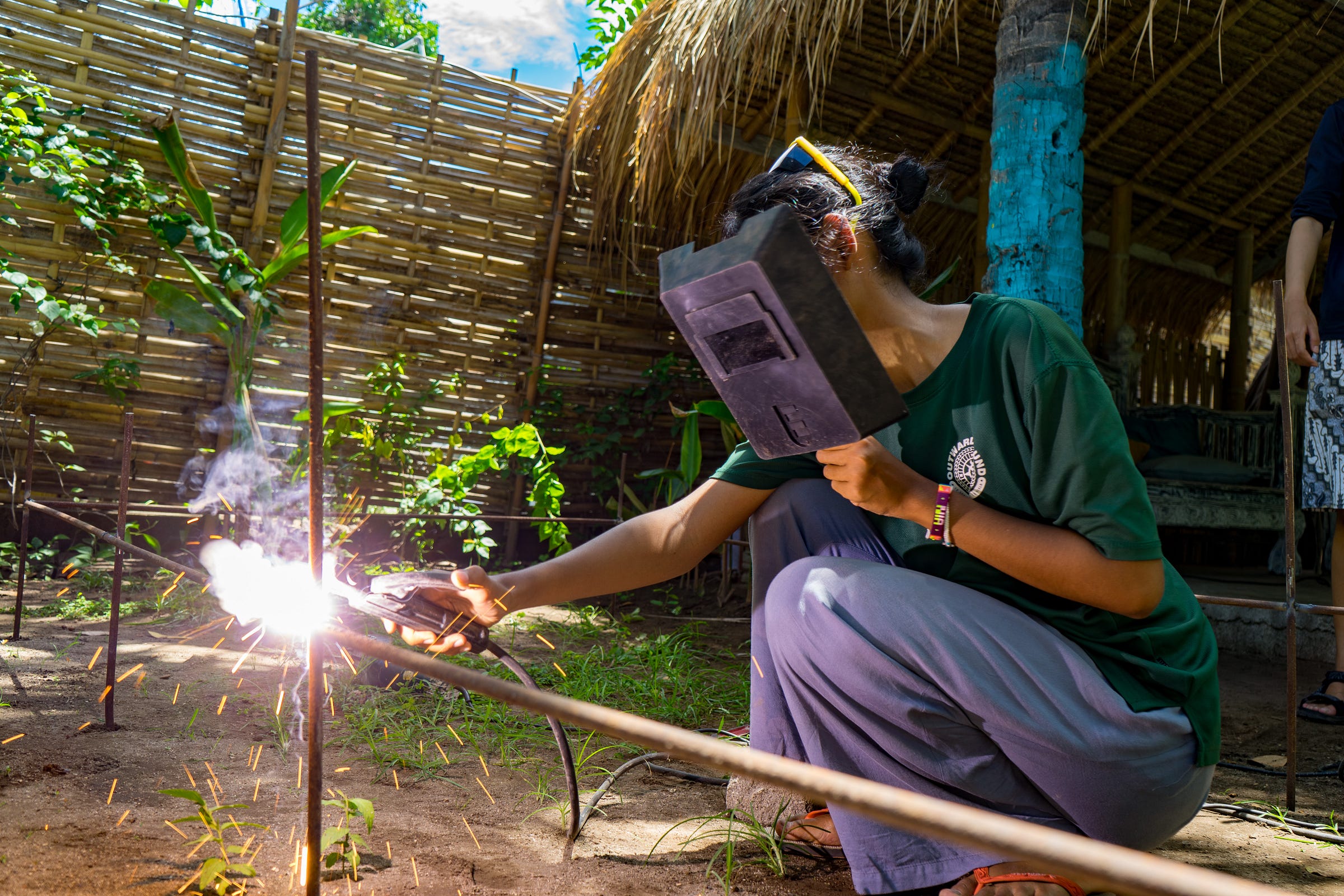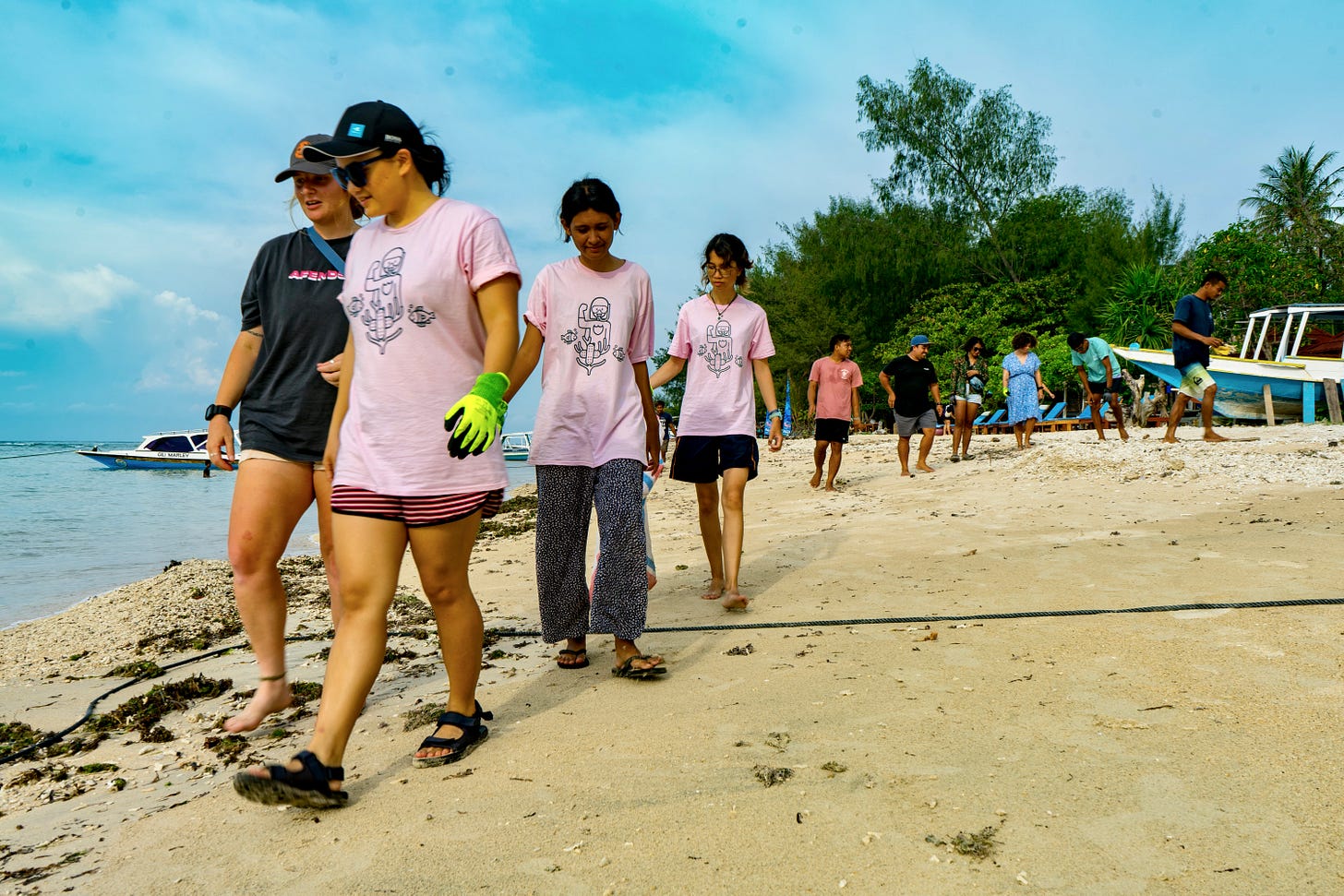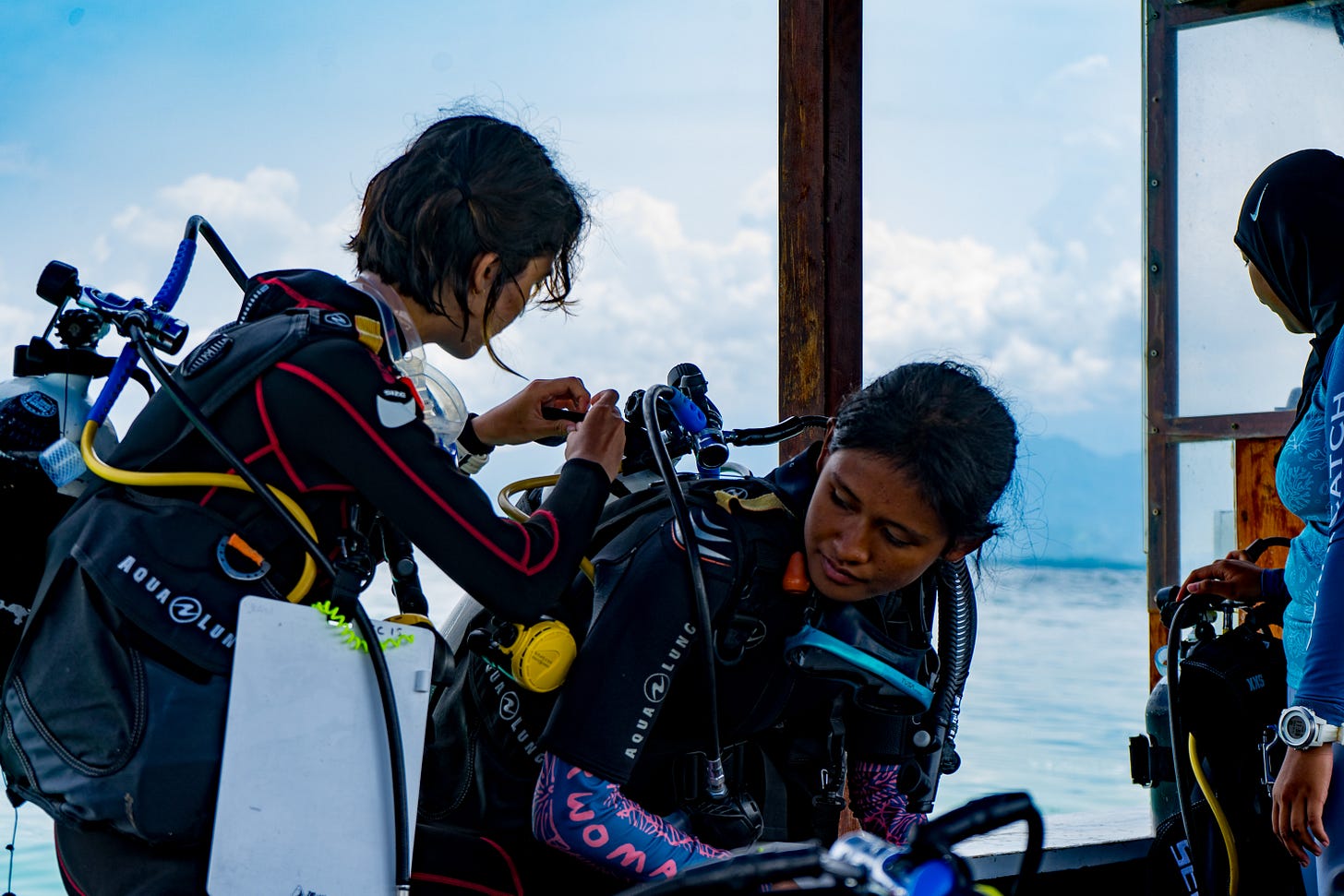Need a Blueprint to Boost Women in Marine Science? Try Coral Catch.
Coral Catch's restoration scholarship doesn't just revitalize reefs, it propels Indonesian women into the ocean science industry, challenging centuries of gender norms in the process.
By week 4, the seasickness had dissipated as swiftly as it had arrived. As our dive boat bounded over the crests of rolling cerulean waves, even the scuba cylinders jumped in their mounts. The four Coral Catch restoration divers onboard, however, appeared unfazed.
With a month of underwater training beneath their belts, these four women had transformed into seasoned scuba divers. Once-common nausea pills were now definitively left on shore.
The divers in question, Hindara Dania, Revata Dharani Sofjan, Hirmaya Kartika, and Brigitta Maria Andrea Gunawan, make up Batch #6 of Coral Catch, Indonesia’s first entirely female coral restoration team.
This forward-thinking coral restoration scholarship was established in 2021 by Rose Huizenga, the Co-Founder and Director of Gili Shark Conservation. Located in the Gili Island Chain, Coral Catch is a rigorous 9-week program that equips participants with the knowledge, tools, and network to develop their own coral conservation projects.
Think of a CEO accelerator program but for women in coral restoration.
This scholarship is unique in that, along with providing comprehensive education, Coral Catch likewise focuses on advancing women's careers and self-image.
“It’s successfully changed the whole island’s perspective,” comments Hindara Dania, a member of Batch #6 and local resident of the Gili Island Chain.
In just over two months, participants develop the skills necessary to excel in coral conservation and restoration. More importantly, the women also learn how to both claim and retain a place in the broader ocean science industry.
As Huizenga reports, of the 24 individuals who have participated in the Coral Catch program, nearly all of them are still employed in the marine science industry or ocean-related trades — a rarity in both Indonesia and the marine sector as a whole.
And this level of retention is more than needed, especially when it comes to coral conservation.
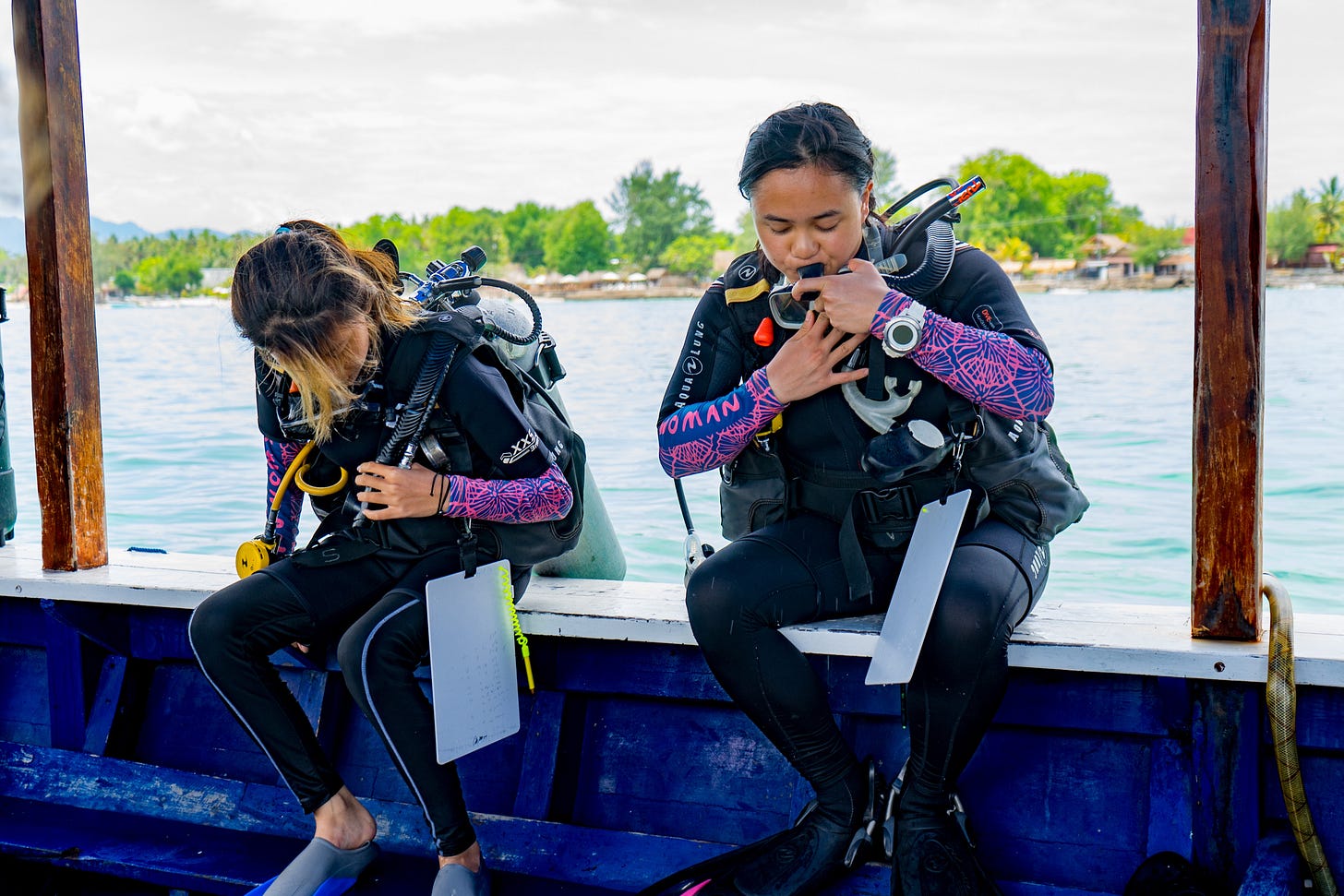
Recent headlines have warned, time after time, that coral ecosystems are rapidly sliding into a global decline. The Great Barrier Reef is estimated to have already lost over 50 percent of its corals due to global warming and mass bleaching events.
These animals — corals, are, in fact, animals — are particularly sensitive to climatic changes, and as ocean temperatures rise, they are increasingly at risk of dying off.
This could have devastating consequences, as corals act as a sort of “canary in the coal mine,” functioning like a barometer for larger ocean health. As the underwater invertebrates vanish, so too will the fish, the sharks, and the livelihoods of everyone who depends on them. Like the infrastructure of a bustling city, they are the backbone of subaquatic civilizations.
Coral reefs support a greater diversity of species per unit area than any other marine ecosystem. The health of coral and the health of aquatic life are deeply intertwined, with humans also intricately entwined in the fate of these often-overlooked animals.
“We rely on the ocean more than we realize,” stresses Brigitta Maria Andrea Gunawan. “The economy depends on it, especially large island nations, smaller developing states, and archipelagos, like Indonesia.”
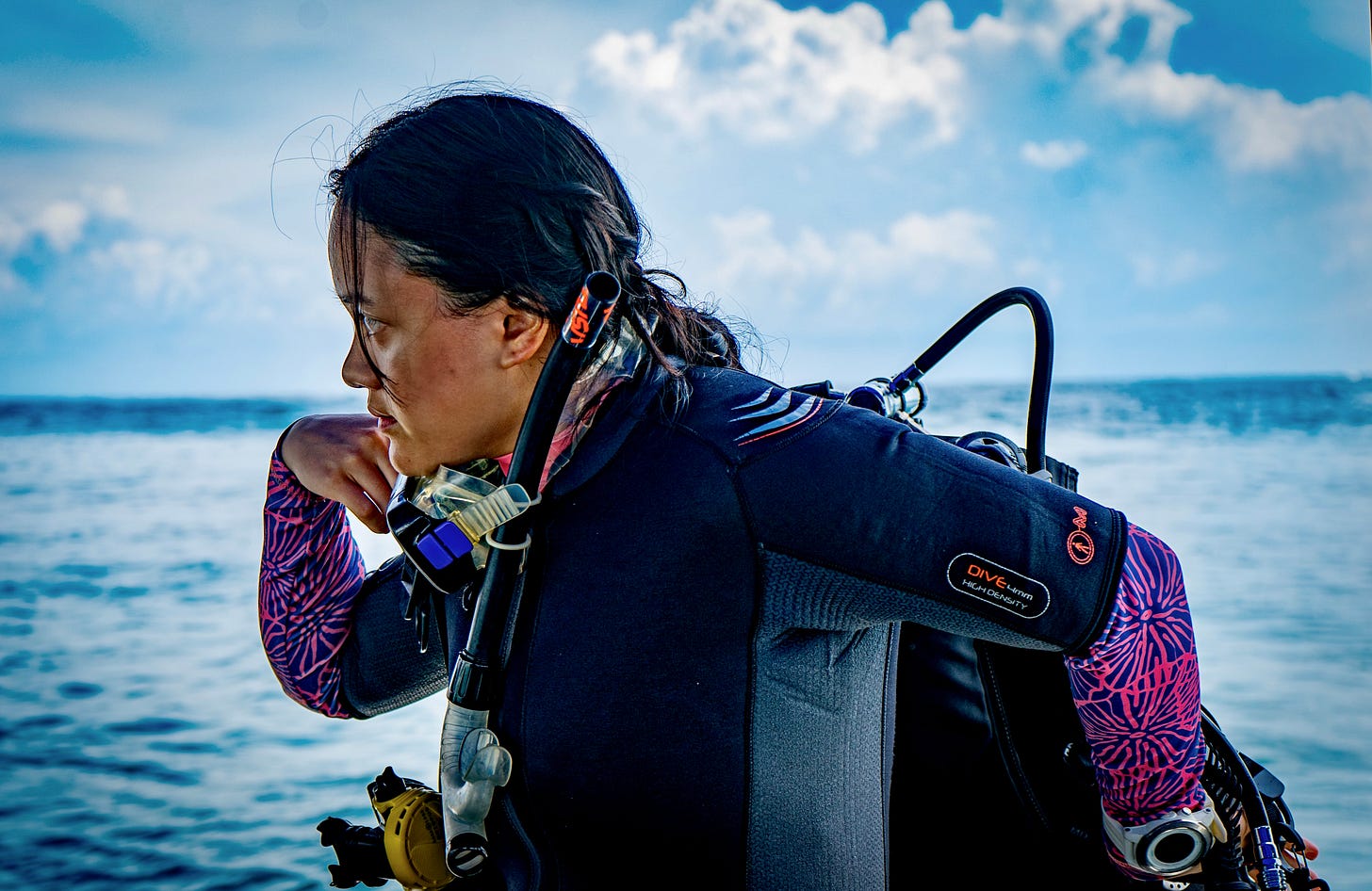
Whether through fishing, tourism, coastal protection, or medicinal purposes, coral holds immense social and monetary value. While not traded like the stocks of Fortune 500 companies, these underwater animals play a significant role in the planet’s economic market. In its 2018 report, the United Nations Environmental Programme estimated that healthy reefs in the Coral Triangle (which Indonesia and Coral Catch sit within) are expected to generate $36.7 billion in economic revenue between 2017 and 2030.
However, that figure only holds if coral remains healthy and abundant. In large part, the degradation Rose Huizenga witnessed daily as a diver in the Gili Matra Marine Park inspired her to create this program. “Even now, we've been here for over 11 years, and we see a dramatic difference.”
Coral Catch’s scholarship works to alleviate some of that ecosystem strain.
Each morning, the Coral Catch program starts promptly at 8 a.m. Amidst the caws of roosters and the humid heat of Gili Air, the Coral Catch participants emerge from their bunks and gather beneath the thatched roof of the program's headquarters.
Situated in Indonesia's Gili Matra Marine Park, the surrounding environment offers a world-class aquatic ecosystem and sub-surface training ground for participants. Following a morning debrief with Coral Catch staff, the Superwomen proceed to the local dive center for the first of their two morning dives, during which they practice scuba skills, underwater navigation, flora and fauna identification, and a variety of other technical tasks.
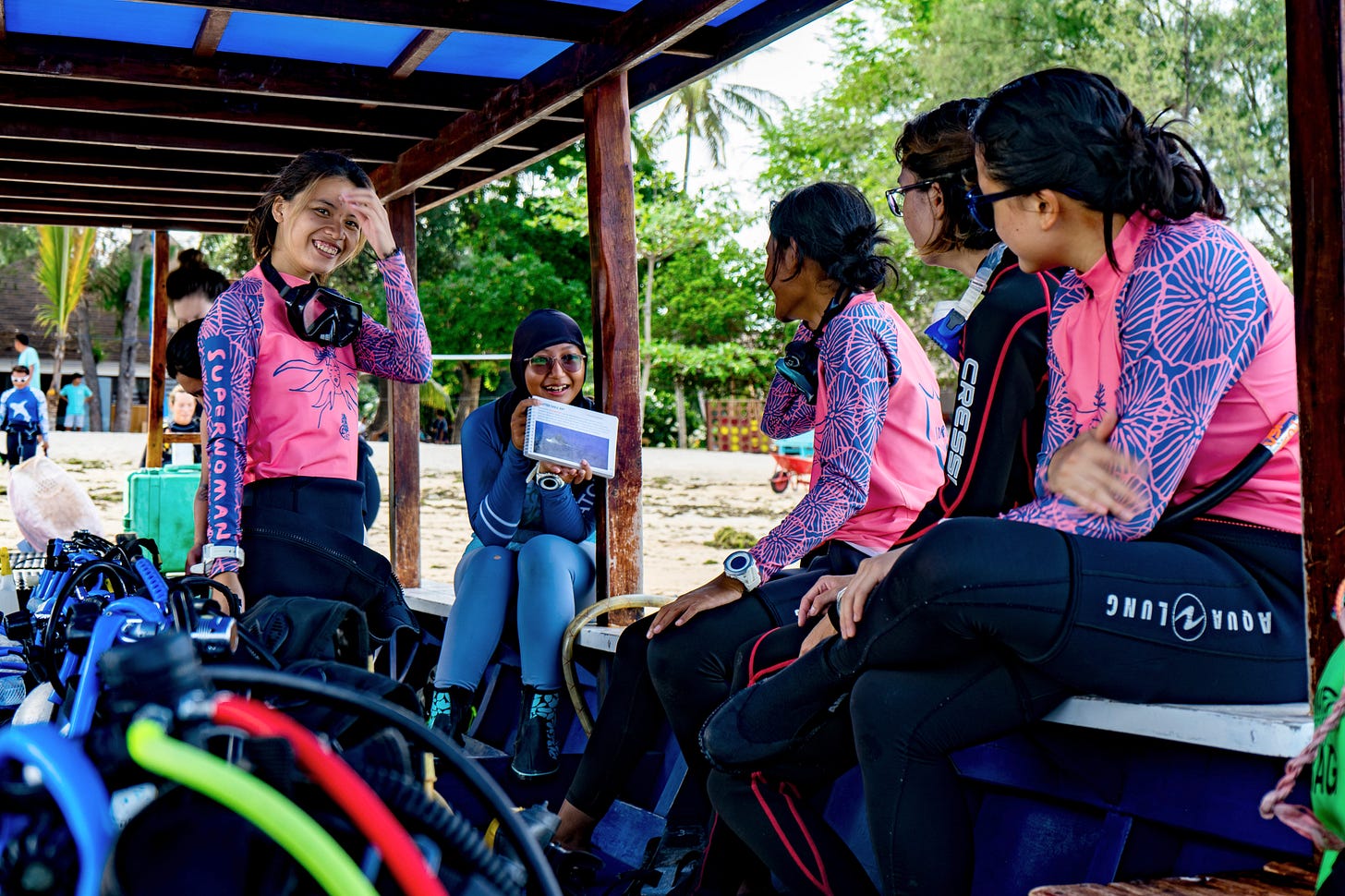

Afternoons are filled with a blend of masterclasses, planning sessions, and empowerment exercises, all tailored to the career ambitions of the participants. Avicenna Wijayanto, Coral Catch’s Program Manager and alumnus of Batch #2, oversees the day-to-day operations of the program. She emphasizes that the learning is intended to be engaging and therefore bespoke.
“I've selected masterclasses that will suit each batch well, depending on their background and interests.”
And, the experiences and passions of Batch #6 are both vast and far from dull.
Hindara Dania's aspirations revolve around discovering medical uses of the marine environment. During her undergraduate years, Revata Dharani Sofjan researched coral-killing sponges. Brigitta Maria Andrea Gunawan is a National Geographic Young Explorer and a Global Citizen Youth Leader. Hirmaya Kartika brings previous experience from her employment in the international soft coral export industry.
With such fascinating pasts and accomplishments, it’s no wonder Coral Catch staff refer to the cohort as “Superwomen.”

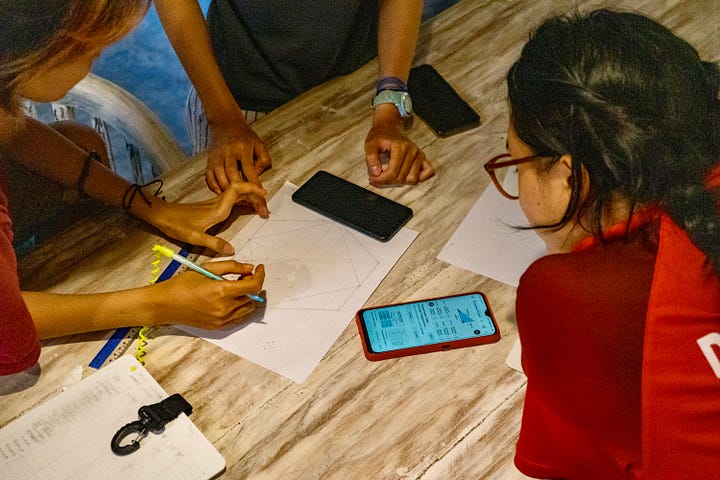
The paths of these aptly named Superwomen are divergent, yet it was their shared passion for coral that led them to this scholarship. Although these underwater animals initially attracted these women to this scholarship, they leave the program with a much broader understanding of the marine environment and the professional world as a whole.
From public speaking to fish identification, GIS lessons, social media crash courses, and welding, in just 9 short weeks, the Coral Catch Superwomen walk away from this experience not just ready to found their own NGO but to literally build it from the ground up.
All of this, says the founder Huizenga, who herself has over a decade’s worth of experience running conservation projects, was very intentional. “Coming from my own experience, to run projects like this, you just need to have a lot of skills. A lot of the time there is no money. You can’t hire a welder, an accountant, or someone to do your social media, so you need to be able to do it all.”
Participants likewise care for coral nurseries during their course, monitoring which kind of growth strategy functions best in The Gili Island Chain. Every session, the Coral Catch cohort designs, welds, and installs its own artificial coral reef structure in the marine park. And, at the end of their nine weeks of learning, each woman exits with a plan to execute her own artificial coral structure back home.
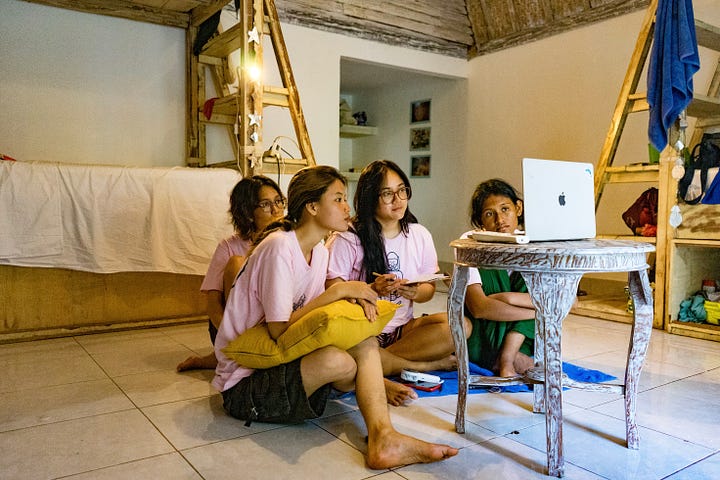
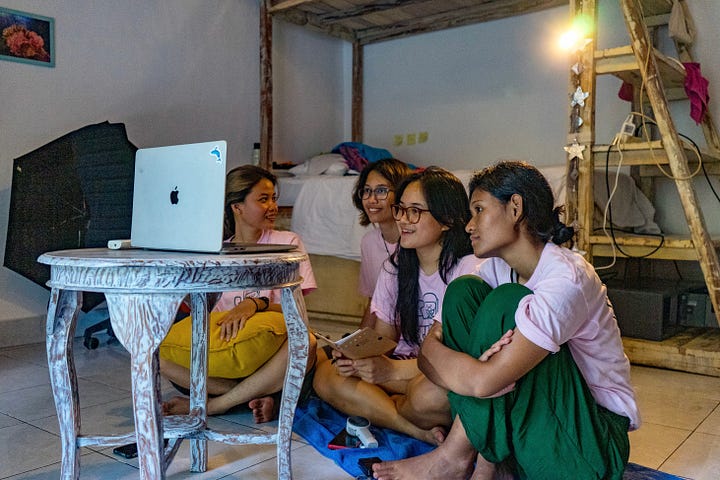
The coral conservation industry can use all the help it can get. Injecting more women into the sector, and keeping them there only proves advantageous for both the health of the ocean and those who benefit from it.
In marine science, while women's representation surpasses that of industries like shipping or boatbuilding, they are disproportionately concentrated in entry-level roles and virtually absent from senior leadership positions.
According to findings published in Biological Conservation’s 2021 issue, a leading international science journal, women occupy just 13% to 24% of senior positions in marine science. The same study identifies a significant decline in the representation of women as they progress throughout their oceanographic careers.
“We're not discrediting men in power. We just want to know why women are often not the immediate thought. When you're trying to invite people in, or when you're trying to gain expertise, why is it that you often look at gender as a pinpoint of credibility?” emphasizes Brigitta Maria Andrea Gunawan.
With C-Suites and senior research positions largely devoid of women, Coral Catch offers a hopeful glimpse into the future of women's oceanographic employment. So how do they do it? How does the scholarship achieve an almost 100 percent retention rate among its alumnae.
It boils down to the program’s comprehensive approach to marine education and confidence building.
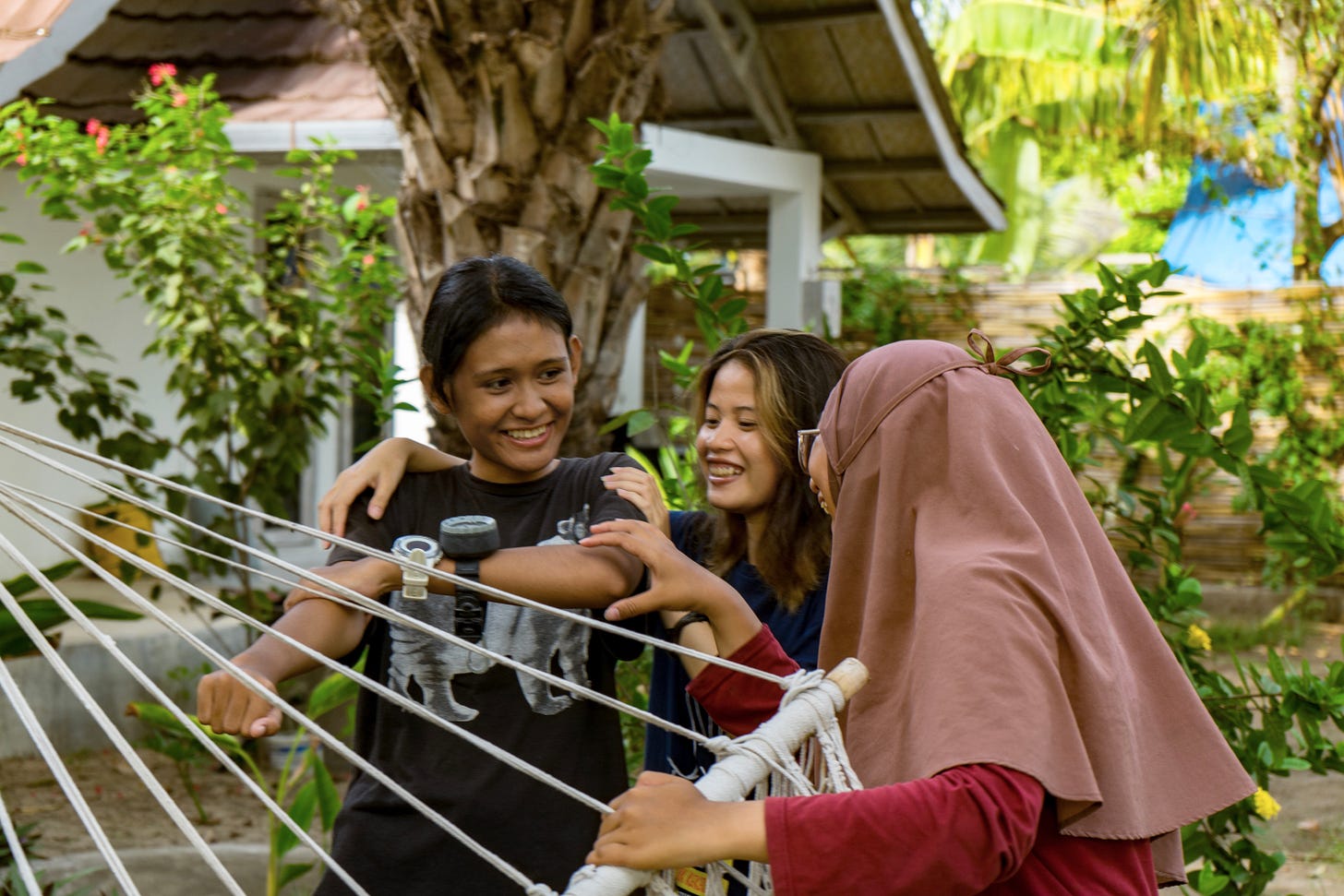
Perhaps more important than the hard proficiencies acquired during the program are the unseen soft skills. In addition to technical experience, the superwomen also gain real-time opportunities to build up their confidence as leaders.
At 4 o'clock on Sunday afternoons, the Coral Catch Superwomen can be found in freshwater rather than saltwater.
At the local pool, the cohort slides into the chilled water to meet the smiling faces of women and children who, for the first time in their lives, are learning to swim. Chest deep in the water, the Superwomen splash alongside the group of nearly twenty individuals as they teach them the basics of water safety, paddling, and breath control.
Each week of the program concludes with a community beach cleanup, where again the Superwomen step gracefully into their roles as leaders and organizers. During their course, the cohort also visits the island’s local school to offer lessons in ocean conservation.

This approach provides a trial-by-fire initiation. From week one, the women are thrust into leadership roles, only to find they excel at them. These experiences are crucial for both building confidence and affirming oneself, especially for those who may not initially self-select as leaders.
Like many participants in Coral Catch, Program Leader Avicenna Wijayanto herself admits that initially she wasn’t inclined to take on a leadership role. During the first weeks of her time as a Coral Catch participant, she admits, “I was really scared.”
After nearly two months of leadership practice, support, and rigorous technical experience, Cenna not only gained confidence in herself but also emerged as a teacher for others. “I felt empowered after my session with Coral Catch,” she says. “It was truly eye-opening for me.”
That sentiment of self-discovery and self-actualization was echoed by many members of Batch #6. “These nine weeks, I’ve learned a lot. I learned to trust people. I learned to open myself up to people, learned to unlearn things,” said Hindara Dania.
A large part of the aforementioned unlearning process entails overcoming the societal constraints typically associated with womanhood. Coral Catch’s programming appears to have found somewhat of a solution to that issue. The all-female environment created by the program may, in part, be responsible for such a cohesive space, free of the microcosms of sexism that can plague other workplace and learning environments.
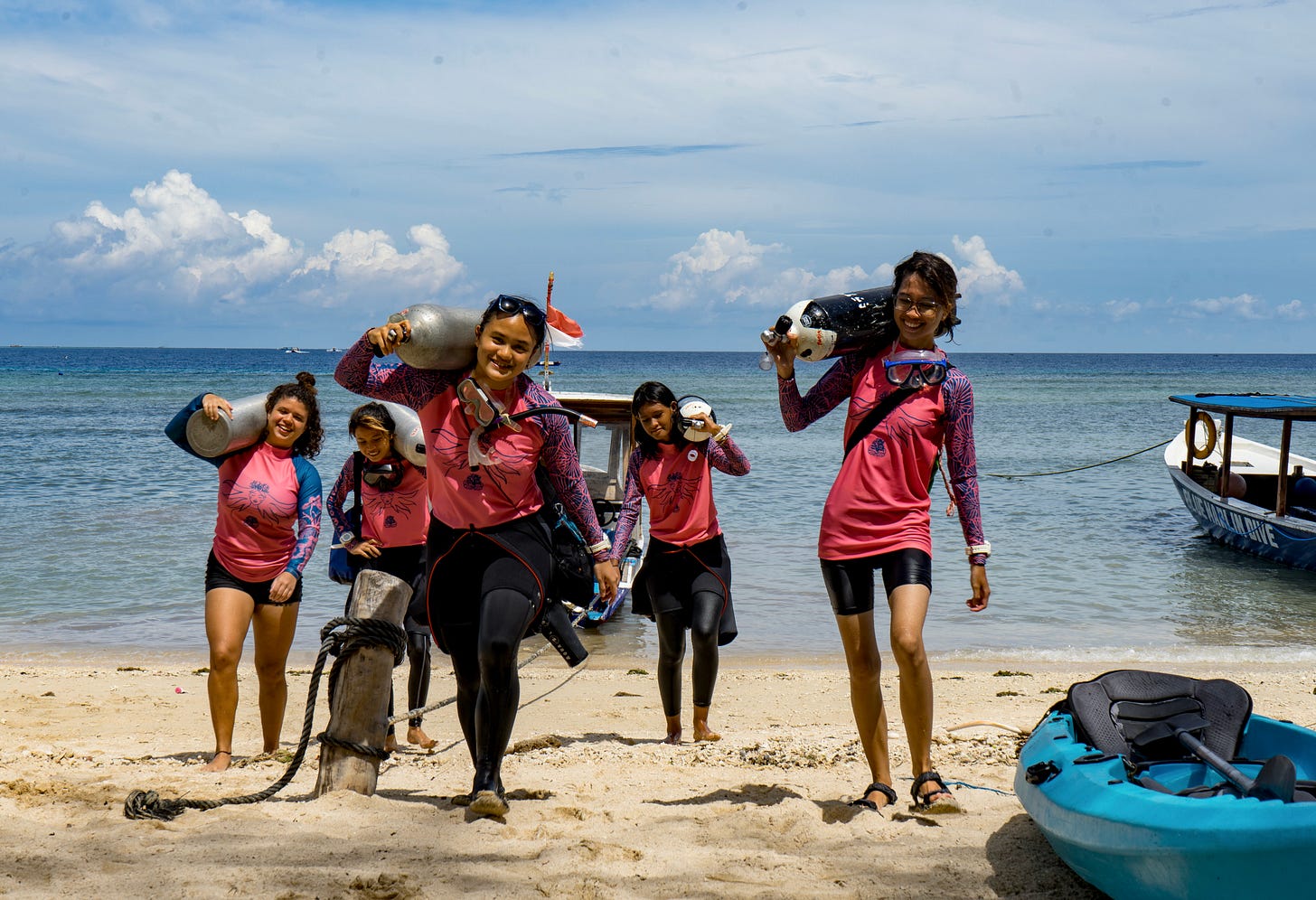
“This program, because it's all women, all diving women, creates a safe feeling. No one is going to judge you,” says Avicenna Wijayanto.
The ability to make mistakes in a judgment-free environment enables effective and accelerated learning. The safe space enables participants to not only be vulnerable in their learning but also with themselves. Many of the young women of Batch #6 remarked about having gained a better understanding of their skills, wants, and desires during this training.
“I think I've learned a lot about myself. Now I start to recognize some of my strengths and areas where I can improve, and that’s really allowed me to imagine what kind of career I want,” says Brigitta Maria Andrea Gunawan.
Coral Catch’s commitment to female empowerment is reflected even in its scheduling. The majority of masterclasses are led by female professionals in the marine science field. Furthermore, in week four of the course, Founder Rose Huizenga intentionally incorporated a women’s circle into the curriculum. Here, the cohort, guided by a local practitioner, has the opportunity to openly discuss their concerns about the future, the program, and anything else with one another.
While this form of empowerment may not seem revolutionary, as many of the participants were quick to point out, this type of women-centered narrative is a rarity in the island nation.
“It's so important because in Indonesia especially, we don't have a lot of women in marine science,” notes Hirmaya Kartika.
In Indonesia, where gender roles still largely confine women to domestic tasks, Indonesian women are rarely seen out on the water or below the surface. Hindara Dania, a member of Batch #6, grew up in the Gili Matra Marine Park. She reflected on her experience as a female diver in the Gili Island chain.
“I remember when I did my open water certificate, the people I met at the harbor were questioning me, saying, “Where are you going? Are you going to dive? You? Aren't you supposed to stay home and cook, do things like that?’”
Unfortunately for those individuals, they didn't know that Hindara Dania has a knack for proving people wrong. “I love a challenge,” she mused.
Since Coral Catch’s inception, over 24 women have passed through the program and internalized its key message of empowerment, spreading it to all those they interact with.
Another crucial aspect contributing to the success of Coral Catch involves the professional network available to its alumnae. As the saying goes, “It's not just about what you know, but who you know.”
Rose Huizenga has worked hard to cultivate a network of Coral Catch Ambassadors, influential women who can provide guidance and support to the Coral Catch cohort. These international career networks offer a plethora of services to emerging women in the field.
Ranging from university professionals to filmmakers to the Director of the Coral Restoration Foundation. Coral Catch graduates have a wealth of powerful women at their disposal whom they can turn to for advice, support, inspiration, or potential opportunities.
There is ample room for everyone in marine conservation.
Coral Catch has shown us all that there is, in fact, a blueprint to integrate women into this industry. Though still in its infancy, Coral Catch’s nearly 100 percent retention rate serves as a resounding testament to the effectiveness of the program.
It's not solely about its comprehensive approach to skills training; it's also about fostering a self-affirming environment that cultivates the confidence of these extraordinary women.
When women feel like they belong in a space, and more importantly, when they feel like they can effectively lead that space, they’re more inclined to step forward and stay there.
Coral Catch is not only facilitating women's entry into the ocean science sector but also ensuring their future within it.
It’s time for the rest of the marine world to follow suit.







